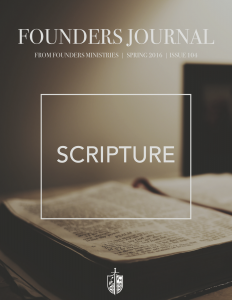People of the Book
From an historical standpoint, Baptists have always been known as “people of the Book.” By this identification, Baptists (since their emergence in 17th century England) had gained the reputation of being that Christian body within Protestantism, whose declaration of doctrine and practice was solely governed and ruled by the Word of God. In fact, the great Reformation principle of sola Scriptura (“by Scripture alone) can be argued as finding its fullest expression with Baptists than with any other Protestant group.
This is why church historian, Robert G. Torbet, in his History of the Baptists, made the case that:
Baptists, to a greater degree than any other group, have strengthened the protest of evangelical Protestantism against traditionalism. This they have done by their constant witness to the supremacy of the Scriptures as the all-sufficient and sole norm for faith and practice.1
So then, from this Baptist conviction – that the Word of God is “all-sufficient and [the] sole norm for faith and practice in the Christian life” – it would therefore be Baptists who would hold forth such biblical doctrines as baptism for believers only, a regenerate church-membership, liberty of conscience, and the separation of church and state. By these teachings, Baptists took the principle of sola Scriptura to its logical and inevitable conclusion: they would seek to assemble local churches, made up of only believers, where Christ ruled as the Head of His church by the revelation of His Word, liberated from any human tradition or government who would seek to lord over their conscience.
But again, what brings Baptists to these convictions is their uncompromising faith in the authenticity of the Bible as the authoritative, inerrant, infallible, and sufficient Word of God.
A Good Confession
Now in Baptist history, this unwavering conviction in the Word of God ruling and shaping their life and doctrine has never been more clearly and plainly expressed than in the first chapter of The Second London Baptist Confession of 1689. In ten paragraphs, the doctrine of Holy Scripture is set forth with such unmistakable limpidity, that it leaves no one to question where these English Baptists stood as to their creed regarding the origin, place, and purpose of God’s Word. But what’s most significant about this confession pertaining to Scripture, is that it was not contained strictly to those Baptist churches in England that held it as their doctrinal standard.
The Second London Confession would prove to be over time, “the most important Baptist Confession written in the English language.”2 Thus, its confessional exposition on the doctrine of Holy Scripture would be the place where several generations of Baptist churches and associations would take their stand without shame or apology. We see this, for example, in America – beginning with the Philadelphia Association in 1707 to the churches forming the Southern Baptist Convention in 1845,3 and beyond. The point of this historical fact is simply to affirm that if we want to know what Baptists largely believed about the Bible, then we need to look further than the first chapter of The Second London Baptist Confession of 1689.
The What of “Holy Scripture”
As we turn to this first chapter in The Second London Confession, the primal and most prominent question to be answered is, “What did Baptists believe about the Word of God?” The initial response to this inquiry is that Baptists stand firmly in the family of Protestant churches as to what they confess concerning God’s Word. In fact, if one compares The Second London Confession to The Westminster Confession (1647) and The Savoy Declaration (1658) – each representing the Presbyterian and Congregationalist churches – they will discover that the Baptists who framed The Second London reflect the wording of these aforementioned doctrinal standards. Hence, Baptists historically, are Protestant by principle and thus Evangelical in their conviction when it comes to the doctrine of Holy Scripture.
But stating this now brings us to the focus of this article which centers on the first sentence in the first paragraph of The Second London Baptist Confession. Returning to the lead question, “What did Baptists believe about the Word of God?,” the opening statement in paragraph one of The Second London says it succinctly:
The Holy Scripture is the only sufficient, certain, and infallible rule of all saving knowledge, faith, and obedience.
Since this sentence is connected to a larger paragraph, it would be proper to see this declaration in its fuller context to begin with. Paragraph one in The Second London is answering the question as to why the written revelation of God’s Word is necessary. Concurring with the biblical truth that “the light of nature, and the works of creation and providence do so far manifest the goodness, wisdom, and power of God, as to leave men inexcusable,”4 one may conclude that God’s creation and man’s conscience is enough to bring sinners into the blessing of salvation. But the writers of The Second London are quick to dispel such a conclusion. They expressly emphatically: “Yet are not they [i.e., God’s works of creation and man’s conscience] sufficient to give that knowledge of God and His will which is necessary unto salvation.” So, while the “general revelation” of God (as it’s called) is enough to leave sinful man “inexcusable” as to the fact that God is there; yet, it’s not ample to bring sinners into the knowledge of redemption.
What then is necessary to bring sinful man into saving faith? What has God given to reveal man’s need of salvation through Jesus Christ? The Second London answers this in three ways from paragraph one. First, God’s revelation of redemption came initially through His prophets in a variety of ways.5 “Therefore it pleased the Lord at sundry times and in divers manners to reveal Himself, and to declare that His will unto His church.” Second, God’s revelation of redemption did not remain only verbal – but God gave His redemptive revelation in written form to preserve it from the fallen world, publish it to the fallen world, and inscripturate precisely what sinners need to know in order to be saved.6 “…and afterward for the better preserving and propagating of the truth, and for the more sure establishment and comfort of the church against the corruption of the flesh, and the malice of Satan, and of the world, to commit the same wholly unto writing.” Third, God’s written Word, being the complete revelation of His redemption for sinners, becomes absolutely essential for bringing men into saving faith.7 “…to commit the same wholly unto writing; which maketh the Holy Scriptures to be most necessary, those former ways of God’s revealing His will unto His people being now ceased.”
Here then is the full context where the initial statement in paragraph one is connected. The Second London is at pains to make it clear that, “The Holy Scripture is the only sufficient, certain, and infallible rule of all saving knowledge, faith, and obedience.” For a sinner to see his sin, his perilous standing before a holy God, and his sole rescue from impending judgment resting exclusively in Jesus Christ alone – such a revelation can only be heard and received from the Word of God. This is why “The Holy Scripture” is “most necessary.”
But with the context of paragraph one explained, let’s now draw in to the content of its opening statement, and consider how it answers our lead question: “What did Baptists believe about the Word of God?”
In the first place, they believed the Word of God is “Holy Scripture”. The emphasis here is on the word “holy”. The Bible is not just any other book. It is peculiar, unique, set apart from all other literature. There are no writings in all of human history like the Word of God, nor will there ever be. This is why it’s “Holy Scripture”. Forty human authors wrote its content, but not by their own intelligence or wisdom. What they wrote was divinely inspired. They wrote “from God as they carried along by the Holy Spirit.”8 This is why the claim of Scripture itself is that all its writings are “breathed out by God.”9 So, for our Baptist forbearers, when they confessed their conviction about the Bible, they declared first and foremost that it’s “Holy Scripture”.
In the second place, they believed the Word of God to be “the only sufficient…rule of all saving knowledge, faith, and obedience.” What must capture our attention from this statement at the beginning, is that The Second London describes the Word of God as “the…rule.” The term “rule” is understood as something which regulates or guides. To call God’s Word then “the…rule” is to point to the fact that God’s written revelation guides and regulates our lives in a certain course. Specifically, it guides us into “all saving knowledge, faith, and obedience.” This means that the “knowledge…faith…and obedience” gained and gleaned from God’s Word is solely redemptive in nature. This is why 2 Timothy 3:15 describes God’s Word as “able to make you wise for salvation through faith in Christ Jesus.” So it’s not just any kind of “knowledge…faith…and obedience” which God’s Word guides us in. Rather, it is strictly that “knowledge…faith… and obedience” that makes us “wise for salvation.”
Keeping this fact before us then, The Second London describes the Word of God as “the only sufficient…rule of all saving knowledge, faith, and obedience.” First of all, it’s the “only…rule…of all saving knowledge, faith, and obedience.” There is no other source which can be claimed to put guilty sinners right with holy God, than God’s own holy Word. This is why the writers of The Second London Confession expounded further on this truth in paragraph six, when they expressed: “The whole counsel of God concerning all things necessary for His own glory, man’s salvation, faith, and life, is either expressly set down or necessarily contained in the Holy Scriptures: unto which nothing at any time is to be added, whether by new revelation of the Spirit, or traditions of men.”
To apply this our times, the popular claim for the continuation of prophetic revelations and the employment of religious methods not warranted by Scripture as the means for bringing sinners to faith in Christ – are canceled by God’s written Word as having any authority or legitimacy. There is no further knowledge we need about God, man, and redemption than what God Himself has given us by His written Word. Thus, when the Holy Spirit illuminates our understanding, He doesn’t give us a new revelation, but rather He opens our hearts to receive what’s already been written as “Holy Scripture”. Hence, The Second London maintains rightly: “We acknowledge the inward illumination of the Spirit of God to be necessary for the saving understanding of such things as are revealed in the Word.” We need the Holy Spirit to give us understanding, but what He enables us to understand are only “such things as are revealed in the Word.”
In light of this therefore, it should not surprise us that the second term used to qualify God’s Word as “the only…rule” for “saving knowledge, faith, and obedience” is the term “sufficient”. Impregnated in this description as it relates to God’s written Word is that nothing can be added or taken away from what God has revealed as His holy Scripture. Furthermore, to claim the “Holy Scripture” as “the only…sufficient…rule” means that everything needing to be said as to what we must believe pertaining to all “saving knowledge, faith, and obedience” is revealed with finality and to completion. Lastly, since the “Holy Scripture is the only sufficient…rule” for redemptive knowledge, then it must be concluded that God has nothing more to say, at this time on this side of glory, than what He has “breathed out”10 as His written Word.11
It is for this reason, historically speaking, that Baptist churches affirming The Second London Confession ordered their services of worship with the simplicity of obedience to God’s Word. Whatever God had commanded was right for worship, and whatever God had not commanded was wrong for worship.12 Hence, for our Baptist forbearers, if what would be called “worship” was not mandated explicitly by “Holy Scripture” then it was not practiced. Thus, all you should find carried out in a worship service was the reading, singing, preaching, and hearing of God’s Word; coupled with the administration of baptism and the Lord’s Supper. And undergirding both this practice and conviction was the unwavering belief in the sufficiency of God’s written Word. Nothing is to be added or taken away from how God has regulated His worship by His Word.
In the third place, what Baptists believed about the Word of God as framed in The Second London Confession, is that “The Holy Scripture is the only…certain…rule of all saving knowledge, faith, and obedience.” The emphasis here is obviously on the term “certain”. This word is conveying the strong confidence that since “The Holy Scripture” is “breathed out by God,”13 then there is nothing misleading or in error as to the contents of all that is written in the sixty-six books it contains. In other words, there are no falsehoods nor contradictions in anything which God divinely inspired His prophets and apostles to pen as “Holy Scripture.”
And this claim in The Second London as to the certainty or absolute trustworthiness of God’s written Word as being entirely free from error in its full content, is merely echoing what the Bible itself claims. Such as Psalm 119:60, “The sum of your word is truth.” Or Proverbs 30:5, “Every word of God proves true.” What God’s own Word is calling us to settle about His written revelation, is that it always tells the truth, and it always tells the truth concerning everything it speaks about. This fact as to the character of “Holy Scripture” is what we identify in our day as inerrancy. We confess that the Bible is the inerrant Word of God. To be more precise, “the inerrancy of Scripture means that Scripture in the original manuscripts does not affirm anything that is contrary to fact.”14 God’s holy Word is the truth, the whole truth, and nothing but the truth.
Now understanding the meaning behind the term “certain” as applied to “Holy Scripture”, we must take special note to how this word is connected to the Bible as “the only…rule of all saving knowledge, faith, and obedience.” The writers of The Second London are pointing us to see and acknowledge that there is no other competent, reliable, accurate, and honest guide to reveal the truth about God and His redeeming grace in Christ than what we read in “Holy Scripture”. It’s the “only” unerring “rule” we have for redemptive knowledge. Thus, everything the Bible tells us and shows about “all saving knowledge, faith, and obedience” we can bank our entire life upon as wholly “certain”.
In the fourth and final place, what Baptists believed about the Word of God, as expressed in The Second London Confession, is that, “The Holy Scripture is the only…infallible…rule of all saving knowledge, faith, and obedience.” The qualifying word highlighted here is the term “infallible”. Where the word “certain” underscored the fact that “Holy Scripture” is completely without error, “infallible” is telling us that it’s impossible for there to be any errors. So, for our Baptist forbearers, it was not enough to claim the inerrancy of “Holy Scripture”. Since the Bible was the Word of God (who is incapable of lying,15 then the certainty of all biblical content is undergirded by its unachievable prospect to err.
As Baptists therefore, we stand on a good and solid confession concerning “Holy Scripture”. It’s the “only sufficient, certain, and infallible rule of all saving knowledge, faith, and obedience.” Here we remain unmoved by the latest religious fads or the increasing pressure of a postmodern culture that calls us to abandon divine truth for hopeless uncertainty. Here we stake all our faith and practice as the church. What more could we want or need. God has given us His Word – the only rule for our redemption in Christ.
1 Robert G. Torbet, History of the Baptists (Valley Forge, PA.: Judson, rev, ed., 1963), p. 483.
2 The Baptist Confession of Faith & The Baptist Catechism (Birmingham, AL.: Solid Ground Christian Books, 2010), p. vii.
3 Timothy and Denise George, ed., Baptist Confessions, Covenants, and Catechisms (Nashville, TN.: Broadman & Holman Publishers, 1996), p. 9.
4 Psalm 19:1; Romans 1:19-21; 2:14,15
5 Hebrews 1:1, e.g., visions, dreams, oracles, etc.
6 2 Timothy 3:15; Hebrews 1:1-2; 2 Peter 1: 19-21
7 Romans 1:16-17; 10:14-17
8 2 Peter 1:21
9 2 Timothy 3:16a
10 2 Timothy 3:16a
11 Deuteronomy 29:29
12 This historic conviction about worship is known as “The Regulative Principle of Worship”, which chapter twenty-two in The Second London Confession expounds in eight paragraphs, under the title, Of Religious Worship and the Sabbath Day. In the first paragraph of this chapter, we can see how God’s Word is set forth as “the only sufficient…rule” for worship: “The light of nature shows that there is a God, who hath lordship and sovereignty over all; is just, good and doth good to all; and is therefore to be feared, loved, praised, called upon, trusted in, and served, with all the heart and all the soul, and with all the might. But the acceptable way of worshipping the true God, is instituted by Himself, and so limited by His own revealed will, that He may not be worshipped according to the imaginations and devices of men, nor the suggestions of Satan, under any visible representations, or any other way not prescribed in the Holy Scriptures.”
13 2 Timothy 3:16a
14 Wayne Grudem, Systematic Theology (Grand Rapids, MI.; Zondervan Publishing, 1994), p. 92.
15 Numbers 23:19; Titus 1:2






















